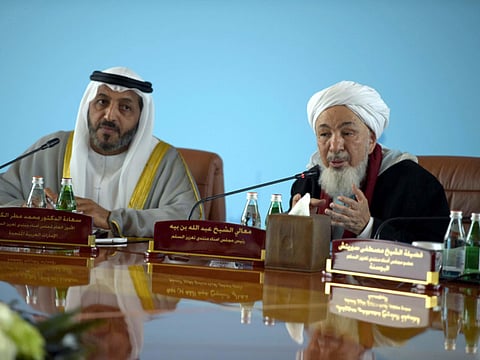Forum to deploy young peace convoys to spread tolerance
150 young envoys to be dispatched worldwide up to 2020

Abu Dhabi: The Forum for Promoting Peace in Muslim Societies plans to deploy peace convoys of young people to spread the culture of peace and coexistence and correct misconceptions about Islam and Muslims worldwide, scholars said on Tuesday.
The forum — a UAE initiative to refute extremist ideologies by making provision for real understanding of Islam as a religion of peace and coexistence — plans to dispatch 150 youths to vent religious tension, promote peace and correct wrong concepts about Islam and Muslims worldwide up to 2020, said Shaikh Abdullah Bin Bayyah, president of the Forum for Peace in Muslim Societies.
Shaikh Bin Bayyah was speaking following a meeting of the board of trustees of the forum in Abu Dhabi.
The drive is part of the forum’s action plan, devised to combat religious extremists who misinterpret religious text to advance their own agenda.
“This year, 50 young peace envoys will be deployed to communicate with different cultures and lay the foundations of peace everywhere, and establish understanding among all peoples, as outlined in the holy Quran and the teachings of Prophet Mohammad (PBUH),” added Shaikh Bin Bayyah, a Mauritanian scholar and president of the forum.
The forum, set up three years ago, attempts to clarify to the world that Islam is a religion of peace and justice. By convening intellectuals and leading thinkers from around the world, the forum also attempts to extinguish burning disputes, according to Shaikh Bin Bayyah.
The peace convoys of young people will be empowered to work towards diminishing the hatred within the nations, and promote coexistence, peace and tolerance.
The peace envoys will be given training with the best and most efficient methods ordered by Islam, already incorporated in the modern methodologies, including respect for different opinions, worthy dialogue about these important religious topics and their balanced relations with the public whether Muslims or non-Muslims, said Dr Mohammad Matar Al Kaabi, Chairman of the General Authority of Islamic Affairs and Secretary-General of the forum.
These envoys, he added, are very crucial in the presentation of the values of Islam and local traditions. “Training the young religious leaders is crucial to face contemporary challenges, to present the fair image of Islam, as well as to clear any extremist ideas which are not in the nature of Islam,” Al Kaabi said.
Dr Radwan Al Sayyed, a professor of Islamic Studies at the Lebanese University and a member of the forum, suggested that the forum hold workshops to put its plans into action.
Dr Al Kaabi agreed and said at least three such workshops will be held in the UAE and others will be held elsewhere as necessary.
Dr Al Sayyed also suggested that the next gathering of scholars and intellectuals must address the theme of ‘Muslims and the World’ to understand ant-Muslim sentiments in western countries where many Muslims report not feeling respected by people there.



